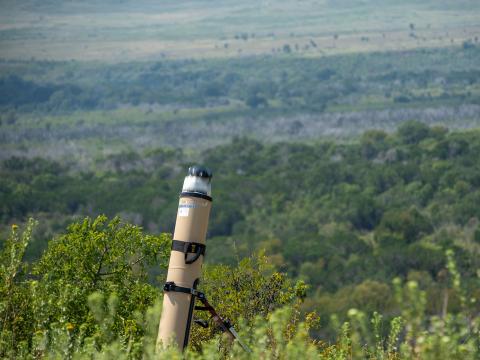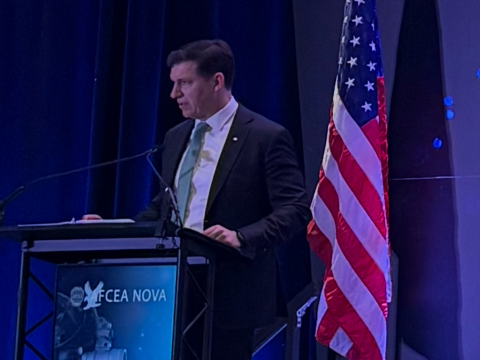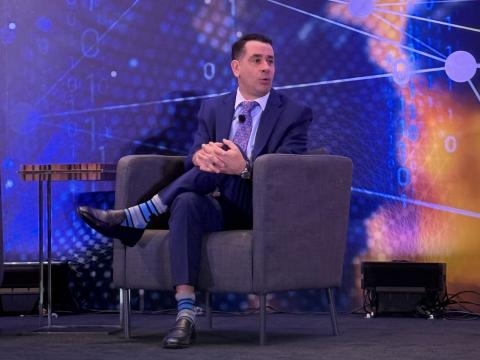A Commentary on Paper Clips, Dry Holes and Moving Cheese
Maj. Gen. Daniel Hughes, USA, program executive officer, command, control and communications-tactical (PEO-C3T), cops to being an impatient man. Patience is one of the first things to go as you age, he says.
That impatience showed during an interview for my March PEO Spotlight column, "Shaking Up the Radio Marketplace." It was a hard-charging zigzag from one topic to the next with a fair number of self-deprecating jokes scattered along the way. He spoke in a rapid-fire manner, as if concerned each word will consume too much time.
The impatience infiltrates his private life. He reveals he is building a Lego Death Star his wife bought for him. He uses his finger and thumb to indicate the miniscule size of each one of the 3,800 pieces. "That's why I have to wear these," he says, lifting his glasses off the table. "Why would she torture me like that?"
He also still dabbles in writing code, he reveals, but claims, "The crap never works."
However, it seems to be the defense acquisition process that irks him most. The software development kit, or Command Post Computing Environment version 3, will help usher in a new era where “you don’t have this long development process that takes seven stinking years,” he says. Since app building will be faster and cheaper, some may be designed for a specific mission and never used again. “I may build an app that is only good for 30 days, but I don’t give a crap, because I don’t have to pay that much, and I can give the soldiers something they need,” he declares.
In addition, the Army’s new radio marketplace, which emphasizes competition over sole-sourcing, will save time on radio procurements. “I don’t want it to take seven, 10 or 15 years to buy a radio. Dear Lord, why would we do that? If companies did that, they would be out of business,” Gen. Hughes opines. “I’m not a sole-source guy. Never have been, never will be. I’ll probably regret saying that, because I may be working at Wal-Mart after this.”
To illustrate his frustration with the process, he recounts a story from 1985 when he was stationed in Germany. “We got a slug of money from the Reagan budget, and we bought typewriters—typewriters!—and paper clips. We had typewriters and paper clips—quote me on this—coming out of our [backsides],” he says. “What I really needed were fuel filters for howitzers, but we couldn’t buy them because we had the wrong kind of money.”
Even when people try to do the right thing, he indicates, sometimes the system gets in the way. “We have a great government-industry-military team. Everyone is vested in going forward, but entropy sets in. No matter what the system is, entropy will set in after a while, so we’re shaking things up to move people out of the way,” he asserts.
To avoid that entropy, he emphasizes the need for young people to bring new ideas and renewed energy to the work force. “I need the 25, 26-year-olds, those folks who are going to offer up 15 ideas,” he says. “I don’t have that drive I had when I was 25 years old. I get up every morning at 4:00 to go for a swim. Sometimes they send somebody out to check on me because they’re like, ‘The dude is getting old.’”
He praises the young engineers on his team. “I don’t know what they do; I just see pizza boxes everywhere. And they never leave. I can’t get rid of them,” the PEO quips.
Gen. Hughes says he encourages his team to take chances and be innovative. “I’m from Texas. Every once in a while, you have to drill a dry hole before you find some oil,” he says. “Being timid in this environment is not a good thing. Risk aversion is death.”
Apparently rethinking his position, he clarifies, “I mean, don’t be stupid. Don’t take risks that are beyond the pale.”
He also encourages his team to read the book “Who Moved My Cheese,” which he was forced to read years ago when he was “whining” about Bosnia, he says. “Don’t think tomorrow that the cheese is going to be in that corner, because the corner will move,” he warns.



Comments